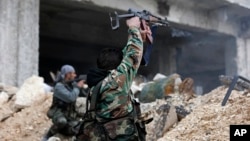Syria's notoriously divisive and schismatic rebel factions are facing a stark choice in the wake of their demoralizing defeat in eastern Aleppo: unify and have a chance of survival or continue to squabble and risk ending the revolution.
But rebel commanders and observers suspect that rifts among insurgent militias will likely increase, despite calls across the Syrian opposition for the armed groups to unite in the face of what activists acknowledge is an existential crisis for the uprising against the regime of Syrian President Bashar al-Assad.
Already after the loss of eastern Aleppo, plummeting morale and signs of splits in Syrian rebel ranks augurs badly for the survival of moderate and pragmatic Sunni insurgent militias. The beneficiaries would be al-Qaida and the Assad regime, warns analyst Aron Lund of the Carnegie Endowment, a Washington-based think tank.
One of the most powerful militias is already on the brink of a major split, according to Lund.
“On December 10,a group of influential figures within the Islamist group known as Ahrar al-Sham announced the creation of a new faction within the movement, to be known as Jaish al-Ahrar. The move, which threatens to escalate into a full-scale rift, caps a long internal power struggle between a Turkey-backed faction of relatively pragmatic Ahrar al-Sham members and hardline rivals who seek to take the group into the orbit of international Salafi-jihadism," he says.
Ahrar al-Sham has been allied with the al-Qaida-tied Jabhat Fatah al-Sham, formerly known as Jabhat al-Nusra, but has long been divided between pragmatic Islamists and a smaller faction that's maneuvered for months to engineer a merger with the jihadists. In the wake of the catastrophic loss of eastern Aleppo, “a messy split could also weaken the more pragmatic Islamist trends within Syria's insurgency and empower the jihadis, by shredding the only force able to balance Jabhat Fatah al-Sham's strength,” warns Lund.
The maneuvering has serious consequences for Syria's faltering insurgency.
“For the Syrian insurgency as a whole, the declaration of Jaish al-Ahrar is bad news. With Assad's forces having nearly completed their takeover of eastern Aleppo, and advancing quickly in the East Ghouta near Damascus, this poorly timed round of internal score-settling between Ahrar al-Sham's competing camps could prove very costly,” he says.
Defending Idlib
In the past, even when faced by Assad offensives, rebel unity has been elusive and only belatedly in eastern Aleppo did the armed groups agree to greater coordination.
In an interview with the Syria Deeply news site, analyst Charles Lister said he expected to see “a lot more talk about unity, more secret meetings, a lot of talk about different mergers between different factions.” But Lister, who is an analyst at the Middle East Institute and author of the book, "The Syrian Jihad," suspects battlefield pressure and the influence of outside countries, which have their own political and ideological agendas, will "encourage more division than unity."
He adds: "A lot of these groups on the more Islamist end are struggling to define their identity at the moment when faced by this big pressure with the fate of the opposition hanging by a thread. They're all having to pick where their ultimate allegiances lie.
"Does Ahrar al-Sham's allegiance lie with the global Islamic project or does it lie with the Syrian revolution? Certain factions within the group are being pulled one way and some the other. From my own internal sources within the group and very close to the group, the prospect of a split is now very much on the cards," Lister argues.
A messy split among one of the most powerful Islamist brigades, would have immediate consequences for the ability of the rebels to ward off an Assad offensive on Idlib, the province neighboring Aleppo and the last large chunk of territory anti-Assad insurgent factions now hold. Idlib is where most of the evacuees from eastern Aleppo are headed, joining hundreds of thousands of other displaced Syrians who have fled to the province over the last few months.
Russian warplanes have already started to pummel Idlib. Military tacticians suspect that Russian and Iranian commanders overseeing the regime's war machine have been readying Idlib to become a "kill box," an area in which foes are funneled and targeted.
Moderate splits
Divisions among Islamists and Sunni militants are matched by splits and disputes in the ranks of moderate militias. The more secular-minded armed groups, which are closer to the original demands of the popular protest against Assad that morphed into the armed uprising, have lost ground and clout consistently the past two years to the hardline Islamists and Jabhat Fatah al-Sham.
Some moderate factions have been diverted from the struggle against Assad and are now fighting with the Turkish-backed Euphrates Shield operation, an Ankara initiative focused on driving Kurdish fighters and the Islamic State terror group away from the border with Turkey.
Other moderate and mainstream opposition factions in Idlib will be impacted by a split in Ahrar al-Sham ranks; a weakened Ahrar al-Sham will make it harder for them to withstand the demands of Jabhat Fatah al-Sham.
The risk is any broad opposition unity talk will collapse in the face of a break-out of factional disputes and schismatic blood-letting — something the Assad regime will be working hard to foment.





